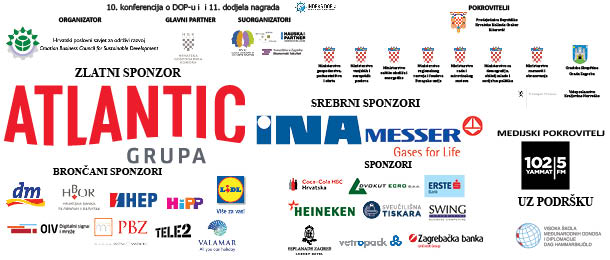11. konferencija o DOP-u i 12. dodjela nagrada Indeksa DOP

11. konferencija o DOP-u i 12. dodjela nagrada Indeksa DOP
Kako izgleda održiva budućnost u Hrvatskoj? Što sve trebamo poduzeti da je ostvarimo? Koji su modeli financiranja održivih projekata? Koja je uloga politike, a koja gospodarstvenika? Odgovore na ta pitanja su na dvodnevnoj stručnoj konferenciji o društveno odgovornom poslovanju dali vodeći svjetski stručnjaci iz održivog razvoja i odgovornog poslovanja te lideri hrvatskih poduzeća.
11. Konferencija o odgovornom poslovanju okupila je u Zagrebu rekordni broj vrhunskih svjetskih stručnjaka iz tema održivog razvoja i društveno odgovornog poslovanja. Oni su u dvodnevnim raspravama nastojali dati odgovore na provokativna pitanja koja su uključila teme: kako EU i Vlada pripremaju odgovore na klimatske promjene, kako formuliraju svoje politike prema Ciljevima održivog razvoja UN-a i zašto su one važne, koje su najbolje prakse korporativnog sektora u tim pitanjima, kako se financiraju održivi projekti te kako se stvara uspješna korporativna klima. Na Konferenciji su po 12. put dodijeljene nagrade Indeks DOP-a
Klimatske promjene “ izazovi i mogućnosti. Promjene klime utječu ne samo na naše životne prilike, odabire i uvjete, već zahtijevaju potpunu promjenu smjera u razmišljanju država, lokalnih zajednica i poduzeća. Uvodnik u temu je dao Srgjan Kerim, makedonski diplomat, predsjedavajući 62. sjednice Skupštine UN-a i posebni izaslanik Glavnog tajnika UN-a za klimu u vrijeme donošenja prvih ključnih dokumenata o klimatskim pitanjima. U panel diskusiji su osim njega sudjelovali Petra Remeta, direktorica programa WWF Adria, Mirko Orlić, profesor s Prirodoslovno matematičkog fakulteta, a panel je moderirala Dunja Mazzocco Drvar, istaknuta hrvatska metereologinja s RTL-a. U raspravi su prezentirane činjenice koje govore u prilog ozbiljnosti situacije kada je promjena klime u pitanju i važnosti brzog djelovanja, ne više toliko na borbi protiv klimatskih promjena, budući da se klima već promijenila, nego na snažnijoj prilagodbi promjenama u gospodarstvu i načinu života koje će neminovno uslijediti. Svi su se sudionici složili da je najvažnije da političari počnu slušati znanstvenike i njihova upozorenja o krizi u kojoj se nalazimo. Naglašeno je da su znanstvenici često i previše konzervativni u svojim mišljenjima te je apel koji upućuju zaista razlog da se ozbiljno počnemo baviti svojim utjecajem na klimu.
Na koje načine mogu europske politike podržati i ubrzati ostvarenje Ciljeva održivog razvoja UN-a tema je kojoj je uvodničar Pedro Ortun, bivši direktor Glavne uprave za poduzeća i industriju u Europskoj komisije. On je iznio tri načina na koje se može ubrzati ostvarenje Ciljeva: pametna kombinacija instrumenata, razvoj poslovnog modela provedbe, te intenzivna suradnja sa svim dionicima u provedbi politika. Panel na temu politika vodila je Maja Božičević Vrhovčak iz Energertskog instituta Hrvoje Požar, a na njemu su sudjelovali Amadeo Watkins s Cranfield University School of Management, Davor Škrlec s Fakulteta elektrotehnike i računarstva i bivši zastupnik Europskog Parlamenta te Dijana Varlec iz Hrvatske gospodarske komore. Za uspješno oblikovanje politika za provedbu Ciljeva održivog razvoja, ključno je koliko često se o njima razgovara na najvišoj razini u organizaciji, kvaliteti odnosa stručnjaka koji se bave DOP-om s članovima Uprave te iznosi budžeta koje smo spremni izdvojiti za provedbu ciljeva i unapređenje održivosti.
Korporativni sektor u Hrvatskoj je predvodnik provedbe Ciljeva održivog razvoja, a o tome su na panelu govorili predstavnici poduzeća - lidera DOP-a. Korporativni sektor u Hrvatskoj razumije rizike povezane s klimatskim promjenama te je bilo govora o tome što rade na ublažavanju posljedica. Posebno je istaknuta važnost utjecaja velikih poduzeća na održivost odgovornim upravljanjem u cijelom njihovom lancu vrijednosti. Prilagodbe inovacijama i novim rješenjima danas su pitanje opstanka, a ne samo izvrsnosti. Na panelu su sudjelovali Sara del Fabbro, predsjednica Uprave i glavna direktorica za održivost IKEA za Jugoistočnu Europu, Ivana Budin Arhanić, potpredsjednica Valamar Riviere, Marinko Došen, predsjednik Uprave AD Plastik te Angelika Brnada, direktorica održivog razvoja i zaštite zdravlja, sigurnosti i okoliša u Ini, a moderirala ga je Mirjana Matešić, ravnateljica Hrvatskog poslovnog savjeta za održivi razvoj.
Na panelu posvečenom održivom financiranju raspravljalo se o novim modelima financiranja održivih projekata. Financijske institucije u Hrvatskoj trebale bi sastaviti popis održivih poduzeća ili projekata, što im može pomoći u upravljanju rizicima, jedan je od zaključaka panela u kojem je uvodničar i moderator bio Sasja Beslik, voditelj održivog financiranja u J. Safra Sarasin Group. Banke trebaju razvijati nove instrumente ulaganja u održivi razvoj, premda se mlade generacije sve više okreću i drugim vrstama i izvorima kapitala. Financijski sektor, a posebno razvojne banke su odgovorni za edukaciju dionika o razvoju održivih praksi kako bi poduzeća razvijala otpornost koju traže investitori i kreditori. Veća transparentnost poduzeća jedan je od bitnih zahtjeva osiguravatelja kapitala. Na panelu su raspravljali Andrea Liverani iz Svjetske banke, Victoria Zinchuk, direktorica EBRD-a u Hrvatskoj, Renata Brkić iz Feelsgood Capital Partners i Hrvoje Galičić iz HBOR-a.
Osim održivosti okoliša i ekonomije, sve više pažnje se posvečuje zdravoj izgradnji poduzeća. Organizacijska klima, izgradnja korporativne kulture i brendiranje poslodavaca postaju teme od iznimnog značaja, a sve više utječu na odgovornost i konkurentnost poduzeća. Uvodnik je iznijela i panel moderirala Zrinka Lovrenčić, direktorica Great Place to Work iz Australije, a u razgovoru su sudjelovale Zdravka Demeter Bubalo, viša potpredsjednica za ljudske potencijale u MOL Grupi i Mirna Koričan Lajtman, profesorica na Luxembourg School of Business. Mladi zaposlenici danas umjesto izgradnje karijere traže žiskustvaś. Kulture se moraju graditi odozdo prema gore, kao i najbolje prakse. Slušajte što vam govore vaši ljudiś, poruka je panelistica. Izgradnja i razvoj uspješne organizacije ne provodi se planovima koje izrađuju Uprave, nego autentičnim inicijativama zaposlenika i njihovim uključivanjem.
Na temu korporativne kulture posebno je predavanje održao Andre Spicer profesor s Cass Business School iz Londona koji je govorio o žsporom upravljanjuś i dao savjete kako poduzeća mogu ostvariti održivost u radnoj okolini.
11. DOP konferencija uključila je tri radne sekcije na kojima su predstavljeni stručni i znanstveni radovi te studije dobre prakse na teme: korporativno upravljanje i alati održivog razvoja; jačanje održivosti: mediji, obrazovanje, standardizacija i analize; te primjeri dobre prakse u ostvarenju ciljeva održivosti.
SPONZORI 11. KONFERENCIJE O DOP-u
ZBORNIK SAŽETA RADOVA 11. KONFERENCIJE O DOP-u
Govornici 11. konferencije o DOP-u

Sasja is a Swedish and international financial expert known for promoting financial sustainability across the world. He has been employed by J. Safra Sarasin since 2019. He was chosen as a Young Global Leader at the World Economic Forum meeting in Davos in 2011. In 2013, he received the Order of the Seraphim from the King of Sweden for outstanding contributions to Swedish environmental and sustainability theory and in 2017 Beslik was named "Sustainability Leader of the Year" by The New Economy magazine.

Renata is a serial entrepreneur and impact investor, strongly devoted to fostering social impact orientation in businesses she has been running herself, or consulting others. In her capacity of the Head of the Social Impact Investment Hub Professor Balthazar, Renata is responsible for the revival of the Professor Balthazar character as a unique, artistic, socially responsible brand, for which she has received a TBAA award as the best social impact investment in South East Europe in 2016. As founding partner of Feelsgood Social Impact Venture Fund, she has been playing a leading role in the process of bringing the European Investment Fund (EIF) as principal investor to the Fund.

Maja holds a Ph.D. in power engineering from the University of Zagreb. Currently, she is a Senior Researcher at Energy Institute Hrvoje Požar. For 10 years, she was an Executive Director of the DOOR, a civil society organisation of experts devoted to the promotion of sustainable energy development, and now serves as the President of the Governing Board of the organisation

Angelika Brnada graduated in 1996 from the Faculty of Chemical Engineering and Technology, University of Zagreb, as a chemical technology engineer in the Department of Chemical Engineering. With 17 years of industry experience in the energy, consumer and oil and gas sectors, her focus is on establishing an effective system in which employees and contractors understand and are motivated to excel in health, occupational safety, environmental and process security.

Zdravka is HR Executive with more than 20 years of proven cross industry experience in Finance, FMCG and Oil & Gas sector working in multinational environment and for large organizations. She holds a proven track record of leading Human Resources in development and delivery of strategic impact to organizations by successful transformation of core business needs into implementable and measurable HR action plans. Core areas of expertise include: HR transformation, HR strategy development and implementation, organisational performance enhancement, among others.

Sara has a long track record with IKEA, beginning in 1999 in Bologna Store and Service Office where she held different senior roles. In 2014 she became Deputy Store Manager in Torino Store and two years later took the helm of Milano San Giuliano Store. In September 2017 Sara became Deputy CEO for IKEA Italy. Sara became CEO and CSO of IKEA South East Europe in June 2019.

Srgjan is a Macedonian diplomat, economist, former Foreign Minister and President of the 62nd Session of the United Nations General Assembly. He served as the UN Special Envoy of the Secretary-General for Climate Changes from 2008 until 2010. In the last decade, he has held more than 100 lectures at international conferences on topics such as: globalisation, resurgent economies, sustainable development and climate changes at universities all around the world, for example NYU and University of Hamburg.

Mirna obtained her Ph.D. from the University of St. Gallen, Switzerland with the thesis śImpact of personal factors on the work-life conflict and its confluence with organisational factors on employee commitment in Croatiať. Currently she is a Professor at the Luxembourg School of Business and the Program Director for MBA in HRM at Zagreb School of Economics and Management where she teaches courses in Human Resources and Management. Within her work she is actively translating books from the area of human resources and business economics and also authors a series of exploratory papers.

Since 2008, Zrinka has been working with organisations across a variety of industries and locations to assess their workplace cultures and support them as they seek to transform their organisations to become not only great workplaces, but increase their shareholder returns. She holds a Bachelor of Commerce and Masters of Management from Macquarie University, as well as an MBA from Macquarie Graduate School of Management. Zrinka was awarded NSW Finalist in the Telstra Business Woman of the Year Awards (2013).

Dunja holds a degree in Meteorology from the Faculty of Science of the University of Zagreb. For thirteen years she worked as a weather forecaster at the Croatian Meteorological and Hydrological Service and currently works as a weather editor and host at RTL Croatia. As a member of the World Wide Weather Meteorologist Group and the Croatian Club of Rome, she is very active in communication regarding weather and climate issues. She is a laureate of the TV Weather Forecast Award in 2018, awarded by the European Meteorological Society.

Mirko graduated from the University of Zagreb and worked as a visiting scholar at the Scripps Institution of Oceanography in La Jolla, Ca, USA. His major research interests include physical processes in the sea, atmosphere-sea interaction, and methods of data analysis. He authored and co-authored about 90 refereed publications, about 150 conference communications, and a book on weather and climate of the Adriatic area. Up to now, the publications have been used in more than 1900 citations in international journals and books. He obtained the Fulbright Award, the Croatian State Science Award, and the Croatian Academy of Sciences Award.

Pedro has a vast experience with the EU institutions, namely the European Commission, where he served as a Director of DG III (Internal Market and Industrial Affairs), responsible for Steel, under the Steel and Coal European Treaty. From 1991 until 2015 he covered all the European Industrial Manufacturing Sectors, as well as all the non-regulated Services Sectors after 2000. The same year he became in charge of leading and coordinating the Corporate Social Responsibility (CSR) "process", which led to the adoption of three EU CSR Strategies by the EC, the last one being the "Renewed EU CSR Strategy" in 2011.

Petra holds a BSc in Hydrogeology and an MSc in Environmental Management. She has ten years of experience in environmental conservation. Starting in private sector with renewable energy development, five years ago Petra joined the World Wide Fund for Nature (WWF). Petra currently serves as the director of conservation programs in WWF Adria office, leading a team that works across eight countries of the Western Balkans on, among others, transforming business practices towards sustainability and CSR.

Andr is a professor of Organisational Behaviour and the founding director of ETHOS: The Centre for Responsible Enterprise at Cass. He is an expert in the areas of Organisational Behaviour, Leadership and Corporate Social Responsibility. He has done work on organisational power and politics, organisational culture, employee identity, the creation of new organisational forms and leadership. His work looks at a wide range of settings including knowledge intensive firms, financial institutions, seaports, universities, libraries, media organisations and new social movements.

Davor is a Professor at the Faculty of Electrical Engineering and Computing in Zagreb. He was Assistant Minister for Environment and Nature in Croatian Government from January until July 2012 when he entered the European Parliament. His major fields of interest include sustainable energy, transport and circular economy. He was a permanent member of ENVI Committee and Member of the Delegation for Relations with Canada. Also, he was a substitute member in the TRAN and REGI Committees and in the EU-Turkey Joint Parliamentary Committee.

Amadeo is a Certified Management Consultant with more than 20 years of professional public management experience with senior level advisory relating to reform and transformation processes in demanding political and cross-cultural settings. His proven experience includes serving as a UK Civil Servant for over 10 years working on strategic government reform and delivery relating to Strategic Management, Leadership and Organisational Development, as well as working at senior government level in various countries on complex change management transformation and optimisation initiatives.











